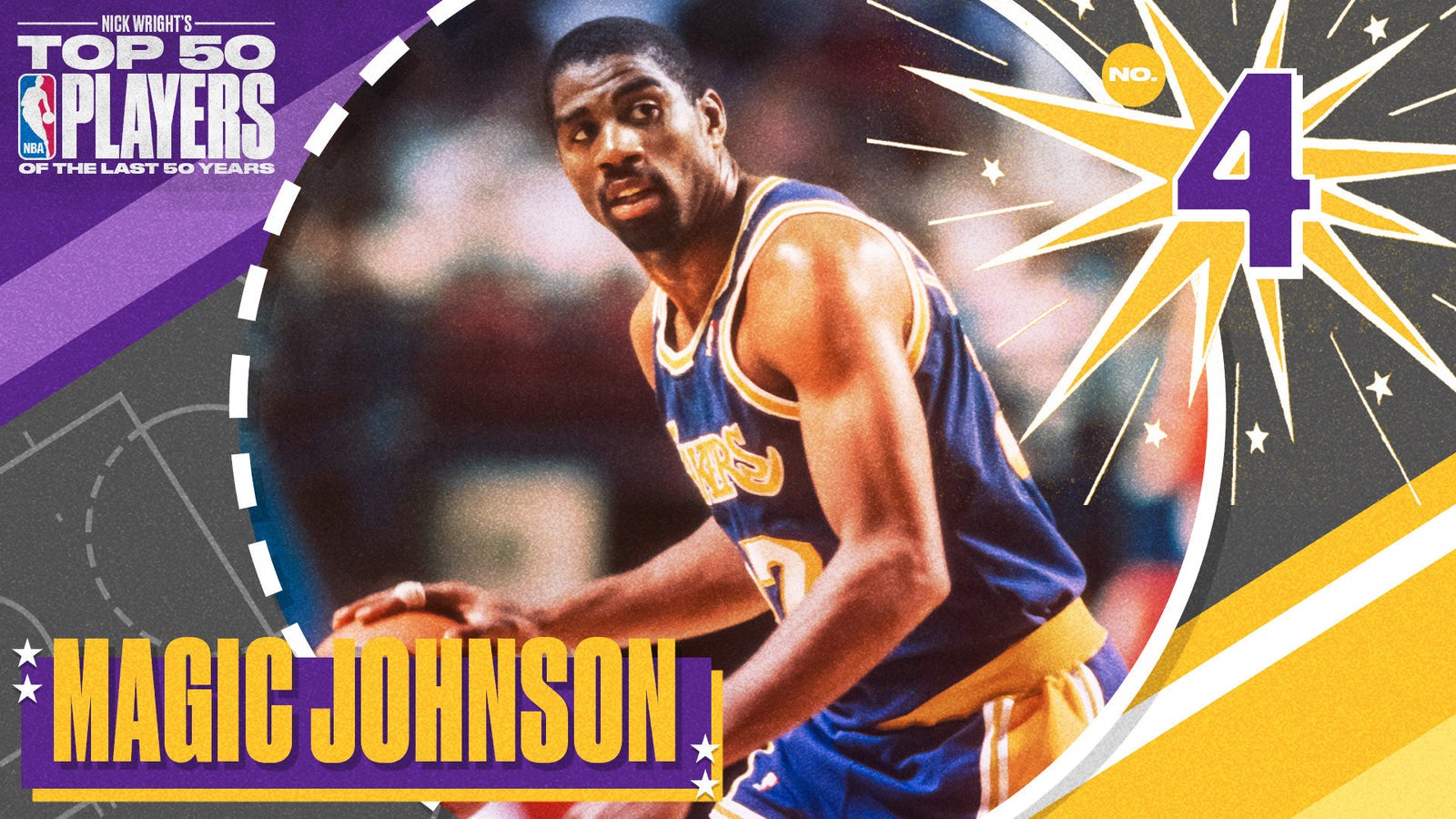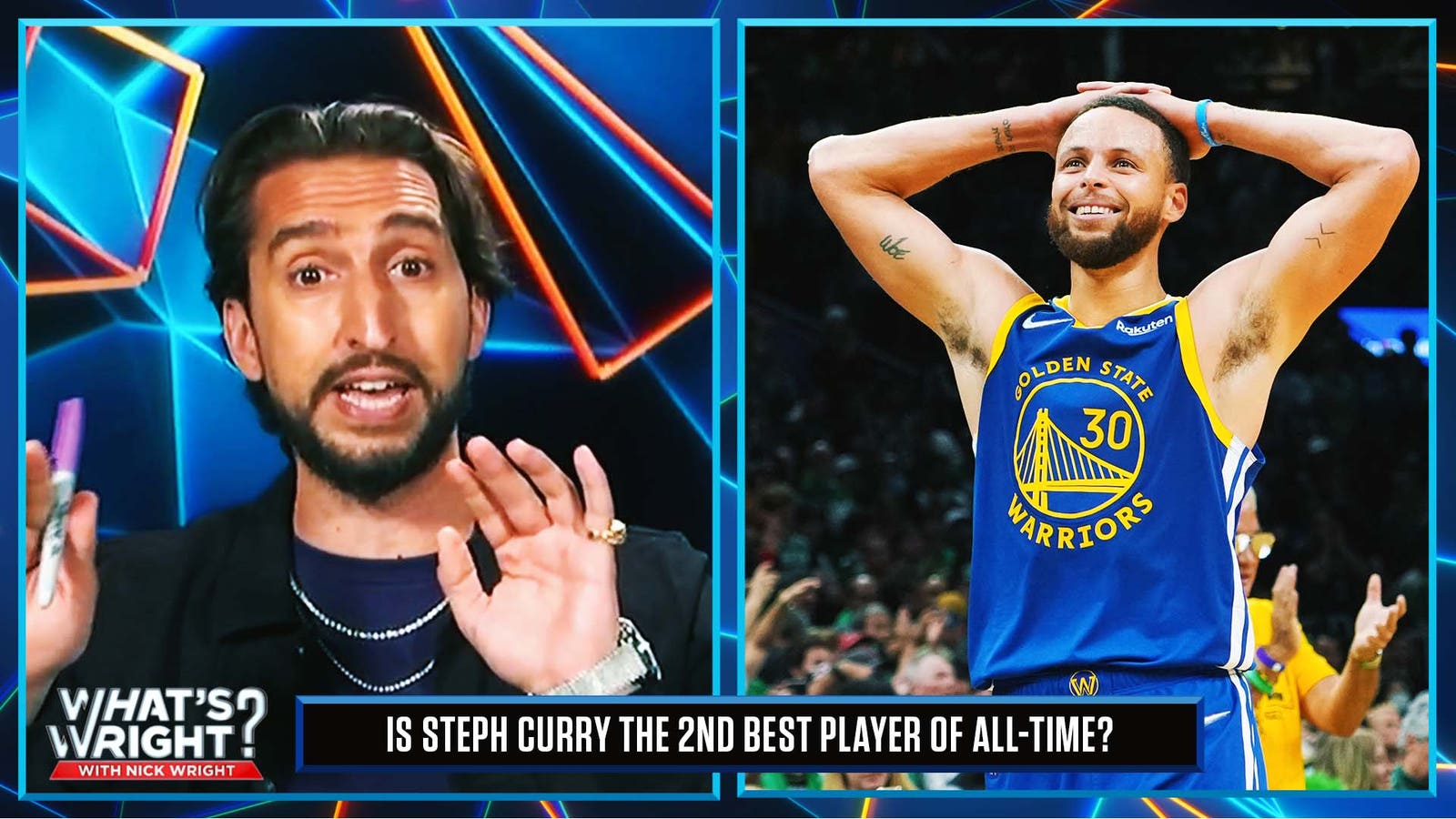
Top 50 NBA players from last 50 years: Magic Johnson ranks No. 4
Editor's Note: As part of a new series for his podcast, "What’s Wright with Nick Wright," FOX Sports commentator Nick Wright is ranking the 50 best NBA players of the last 50 years. The countdown continues today with player No. 4, Magic Johnson.
Magic Johnson’s career highlights:
- Three-time Finals MVP
- Three-time league MVP
- 12-time All-Star
- Nine-time first-team All-NBA, one-time second team
- Four-time assists leader
- Two-time steals leader
- 1980 All-Rookie team
- Highest career assists average
A coin toss, as it did with No. 1 overall picks for about 20 years, determined the fate of rookie Earvin Johnson. The fortuitous flip meant he was headed to the Lakers to play alongside the best player in basketball.
Of course, the Michigan State product was already Magic by then. And he would prove to be the most unique player in NBA history.
"When you go back and watch these games, he is just playing the sport differently than anyone ever had up to that point and, honestly, than anyone ever has since," Wright said.
Magic Johnson is No. 4. on Nick Wright's Top 50 NBA Players of the Last 50 Years
That explains the exceptional production and winning. All Magic did, in fact, was win. The 6-foot-9 unicorn never went more than one year without making the Finals and owns the highest combined winning percentage in the regular season and postseason of any player (72.8%).
"There are too many insane games to list them all," Wright said.
Some simply have to be. A 20-year-old Johnson opened his postseason career with consecutive triple-doubles. He closed the championship run by jumping center in place of an injured Kareem Abdul-Jabbar and posting 42 points, 15 rebounds and seven assists at Philadelphia. The iconic Game 6 performance earned him a controversial Finals MVP selection over Kareem, though there was nothing divisive about Magic averaging 22-11-9 with three steals in the series.
Johnson was an immediate superstar. He’d become a certified legend within two years, averaging roughly a triple-double for the 1981-82 season (18.6/9.6/9.5) before winning a second Finals MVP with a triple-double in the clinching game against Julius Erving's 76ers. At this point, he wasn’t even regularly playing point guard yet.
With Abdul-Jabbar gradually declining, Johnson filled in wherever needed. He averaged 18-9-13 in the 1983 playoffs, which ended in a Finals sweep to Moses Malone and the superior Sixers.
"I think Magic is truly positionless, could dominate at any spot, and in this era where you don’t have to defend dominant centers, could be the ultimate small-ball cheat code," Wright said.
Magic moved to point guard for good the following season and averaged a career-high 13.1 assists per game. He’d guide L.A. back to the Finals and a coveted matchup with the rival Boston Celtics. Johnson and Larry Bird took turns imposing their will before the Lakers leader faltered over the final games as Boston prevailed. Magic’s early success had set such high expectations, the smallest of slumps prompted people to call him "Tragic."
What a mistake.
Steph Curry is not ranked No. 2 all time above LeBron, Magic or Kareem
Johnson responded by going into another gear in the 1985 playoffs, as the Lakers rolled through the Western Conference for a fourth straight Finals appearance. In a thrilling rematch with the Celtics, Magic went for 26 and 17 in Game 5 to give L.A. a 3-2 lead. He averaged a Finals-record 14 assists in the six-game series win – Johnson owns the six best assist rates in the title round – beautifully orchestrating what would be the peak of the "Showtime" Lakers. Magic registered an absurd 15.2 assists for the postseason.
The Lakers and Celtics were on track for a trilogy until Houston stunned L.A. in the conference finals. Johnson put up 22-8-16 per game in the series, only to see Hakeem Olajuwon decisively outduel a 38-year-old Abdul-Jabbar.
Magic took it upon himself to shoot more the following season and scored a career-high 23.9 points while still leading the league with 12.2 assists. That earned him his first league MVP. The Lakers went 11-1 in the West bracket before again taking on the defending-champion Celtics in the Finals. Johnson was in complete control through three games (28-8-14). His Game 4 exploits are timeless. After rallying the Lakers back from a 16-point deficit in the second half, Magic took Kevin McHale off the dribble and sunk a junior sky hook over Boston’s big three with two seconds remaining for a one-point lead. L.A. won the championship rubber match two games later, with Johnson claiming a third Finals MVP after averaging 26-8-13.
In 1988, the Detroit Pistons ended the Celtics’ reign in the East and were on the verge of taking out the Lakers. But Johnson went for 22 and 19 in Game 6, as L.A. narrowly overcame a heroic performance from Isiah Thomas. James Worthy’s historic Game 7 (36-16-10) netted him MVP honors, even though Magic had been markedly better throughout the series (21-6-13 on 55% shooting).
"This should have been Magic’s MVP," Wright said. "They gave it to Worthy because Worthy had the unbelievable Game 7."
Johnson averaged 23-8-13 en route to winning his second league MVP in 1989. He steered the Lakers to an 11-0 mark ahead of a Finals rematch with Detroit. Magic went down with a hamstring injury in Game 2, however, and L.A. was swept.
Despite Kareem’s retirement, the Lakers won six more games the following year (63 in all) and Johnson repeated as MVP. Their streak of Finals appearances would end, however, in a second-round upset to the Suns. Magic, it should be noted, scored 43 points on 58% shooting in each of the series’ last two games.
Although 1990 marked the end of the Pat Riley era in L.A., Johnson got the Lakers back to the Finals the very next season (and broke the league record for career assists). His triple-double in Game 1 paced a two-point win over the Bulls. He played fantastic throughout the five-game series (19-8-12), but the battle belonged to Michael Jordan.
Five months later, Johnson shockingly revealed he’d been diagnosed with HIV. After 12 peerless seasons, he retired at 32. But not before he won five titles, reached nine Finals and set innumerable (and perhaps untouchable) NBA marks, including assist averages of 11.2 in the regular season and 12.3 in the playoffs. He dished out 20 assists in 10 playoff games. There are 10 other such outputs in league history. Nobody tops Magic's 30 postseason triple-doubles. For his career, he scored 19.5 points and grabbed 7.2 rebounds while shooting 52.0%.
Johnson finished top three in MVP voting a record nine consecutive years.
"I can't call him underrated, but it is a little frustrating to me when I hear people arguing, is Steph [Curry] the greatest point guard ever? No," Wright said. "The conversation for greatest point guard ever starts at No. 2 because Magic Johnson transcended the rankings. He is without question the greatest point guard of all time.
"The only question about Magic is, if not for HIV, would he be considered the GOAT?"











